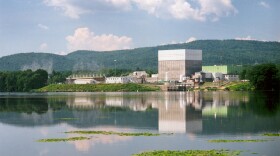New York's highest court says the state has the right to review federal relicensing applications for the Indian Point nuclear power plant along the Hudson River. Despite the apparent setback, Indian Point’s owner believes there are still ways to achieve the necessary certification for relicensing.
Monday's unanimous Court of Appeals decision, reversing a midlevel court ruling, says the New York Department of State has the right to review Entergy's applications to ensure consistency with coastal protections. Jerry Nappi is spokesman for Indian Point parent Entergy.
“Entergy’s going to take some time to review the decision by the court to look at our next steps,” Nappi says. “We have options and alternatives that would still enable us to achieve what we need to demonstrate to the NRC which is that we comply with the state’s Coastal Zone Management Program. So that’s our next steps, really.”
State Attorney General Eric Schneiderman called the court decision a major victory for the continued health and productivity of New York’s environment. He notes that in November 2015, the Department of State denied a coastal consistency certification for Entergy’s Indian Point relicensing application to the Nuclear Regulatory Commission. Entergy sued. Paul Gallay is president of Riverkeeper, which has long called for the closure of Westchester County’s Indian Point.
“This is a major victory for people who understand that Indian Point’s days are numbered,” Gallay says.
Governor Andrew Cuomo issued a statement Monday that says, in part, “The Department of State already concluded that the Indian Point relicensing application is inconsistent with New York’s long-standing Coastal Management Program requirements and will continue to use this program to protect New York’s coastline. Indian Point is antiquated and does not belong on the Hudson River in close proximity to New York City, where it poses a threat not only to the coastal resources and uses of the river, but to millions of New Yorkers living and working in the surrounding community."
Meanwhile, Nappi speaks to how Entergy might seek compliance with New York’s coastal zone policies.
“Previously, Entergy filed with the NRC a letter that demonstrates New York state issued Indian Point its coastal management permit,” says Nappi. “So, for example, when Entergy purchased Indian Point from the New York state Power Authority, the state of New York issued a valid coastal zone certificate. So we call that path previous review, so the facility was previously reviewed by New York state and issued a valid permit.”
He says grandfathering is a different path, the one taken in the court case and rejected. Entergy purchased Indian Point 3 from the New York Power Authority in 2000, and Indian Point 2 from Con Edison in 2001. Nappi says both units were reviewed for coastal zone management plan consistency at the time of sale. NRC spokesman Neil Sheehan addresses the appeals court decision.
“We’ll have to look at where exactly things stand at the point where the presidentially-appointed commission that oversees the NRC is ready to render a decision on the application. And we can’t even, at this point, give an exact timeframe as to when that will occur,” Sheehan says. “But we can’t say, at this point, that a negative ruling by the state on the coastal zone management issue would be a showstopper for the application. We just, we don’t know exactly what will happen until these various processes play themselves out.”
He says, at some point, Entergy could appeal the decision to the Secretary of Commerce, who likely will be a different person under the Trump administration. Riverkeeper’s Gallay is an attorney who once worked in the state attorney general’s office as well as with the DEC.
“We don’t need Indian Point,” says Gallay. “It isn’t safe anymore and it’s holding us back from switching to the safer, more sustainable sources of power that New York can tap the minute Indian Point closes.”
Supporters of Indian Point highlight that the plant produces about 25 percent of the electricity in New York City and Westchester with virtually no greenhouse gas emissions.
There is another state permit required for relicensing that also has been denied. The Department of Environmental Conservation in 2010 denied a water quality certificate for Indian Point. Entergy is contesting this denial and the matter continues before DEC administrative law judges. The license for Indian Point 2 expired in 2013. The license for Indian Point 3 expired in 2015. The reactors continue to operate until the NRC renders a decision on the 20-year licenses.






